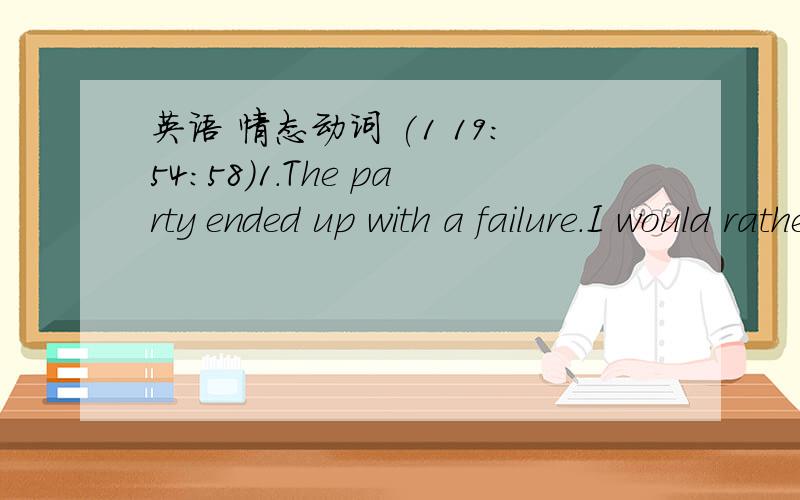英语 情态动词 (1 19:54:58)1.The party ended up with a failure.I would rather ___ the party.A.not have attended B.not attend C.not to attend D.not to have attended2.I saw Mr
来源:学生作业帮助网 编辑:作业帮 时间:2024/11/05 16:06:07

英语 情态动词 (1 19:54:58)1.The party ended up with a failure.I would rather ___ the party.A.not have attended B.not attend C.not to attend D.not to have attended2.I saw Mr
英语 情态动词 (1 19:54:58)
1.The party ended up with a failure.I would rather ___ the party.
A.not have attended B.not attend C.not to attend D.not to have attended
2.I saw Mr.Smith just now.He ___to Paris for a conference.
A.couldn't go B.mustn't go C.couldn't have gone D.might not
英语 情态动词 (1 19:54:58)1.The party ended up with a failure.I would rather ___ the party.A.not have attended B.not attend C.not to attend D.not to have attended2.I saw Mr
情态动词在句中放在谓语动词之前,谓语动词前若有助动词,则在助动词之前,疑问句中,情态动词则在主语之前.
I can see you.Come here.
我能看见你,过来吧.
He must have been away.
他一定走了.
What can I do for you?
我能帮你吗?
How dare you treat us like that!
你怎能那样对待我们!
第一题选 A
1、would rather 后加动词原形,不是不定式,排除C和D
2、首句用的是ended,过去式.would rather 表示一种意向,翻译为“宁愿”,既然事情已经过去了,就只能用完成式了,翻译为:我宁愿自己没有参加过那个party.would rather 后边如果跟一般式,应翻译为“我宁愿不去参加”,一定是还没发生,此处不适合.
第二题选 C
1、D明显不对,连个动词没有(似乎是楼主打漏了吧,不过即使加上个go也不对)
2、B典型错误,比D还错.mustn't表示禁止.如:You mustn't smoke!
3、could/can的否定形式有两种可能:表示推测 和 翻译为“不能”.此处A没有什么特殊意义,把A填到空里应该翻译为“他不能去……”,人家为什么不能去啊?排除掉!C就是表推测了,have gone表示已经去了,而有了题目前一句,就不可能have gone,所以此处the speaker推断了一下.
其实我自身不太会讲,你可能也发现了,我也只能讲到这种程度了.
另外,两个小题讲下来也挺费劲,如果能有幸被采纳的话,0分也太少了,
助动词(auxiliary)主要有两类:基本助动词(primary auxiliary)和情态助动词(modal auxiliary).基本助动词有三个:do,have和be;情态助动词基本的有十四个:may,might; can,could; will,would; shall,should; must,need,dare,used to,ought to.had better 上述两类助动词的共同特征是,在协助主动词构成限定动词词组时,具有作用词的功能:
1) 构成否定式:
He didn't go and neither did she.
The meeting might not start until 5 o'clock.
2) 构成疑问式或附加疑问式:
Must you leave right now?
You have been learning French for 5 years,haven't you?
3) 构成修辞倒装:
Nowhere can he obtain any information about his sister.
Hardly had he arrived when she started complaining.
4) 代替限定动词词组:
A:Who can solve this crossword puzzle?
B:Tom can.
A:Shall I write to him?
B:Yes,do.
can和could的用法
1.表示能力或客观可能性,还可以表示请求和允许.如:
Can you finish this work tonight?
Man can not live without air.
— Can I go now?— Yes,you can.
注意:①could也可表示请求,语气委婉,主要用于疑问句,不可用于肯定句,答语应用can(即could不能用于现在时态的简略答语中).如:
Could I come to see you tomorrow?
Yes,you can.(否定答语可用No,I'm afraid not.)
②can表示能力时,还可用be able to代替.如:
I'll not be able to come this afternoon.
2.表示惊异、怀疑、不相信的态度.(主要用在否定句、疑问句或惊叹句中)
Can this be true?
How can you be so careless!
This can not be done by him.
3.“can(could) + have + 过去分词”的疑问或否定形式表示对过去发生的行为怀疑或不肯定.如:
He can not have been to that town.
Can he have got the book?
4.用在疑问句及否定句中,表示惊讶,不相信等.
5.can not```too\enough表示"无论怎样``````也不过分","越``````越好"
我有高中英语情态动词专题视频讲座,你听听吗????
第一题选 A
1、would rather 后加动词原形,不是不定式,排除C和D
2、首句用的是ended,过去式。would rather 表示一种意向,翻译为“宁愿”,既然事情已经过去了,就只能用完成式了,翻译为:我宁愿自己没有参加过那个party。 would rather 后边如果跟一般式,应翻译为“我宁愿不去参加”,一定是还没发生,此处不适合。
第二题选 C
全部展开
第一题选 A
1、would rather 后加动词原形,不是不定式,排除C和D
2、首句用的是ended,过去式。would rather 表示一种意向,翻译为“宁愿”,既然事情已经过去了,就只能用完成式了,翻译为:我宁愿自己没有参加过那个party。 would rather 后边如果跟一般式,应翻译为“我宁愿不去参加”,一定是还没发生,此处不适合。
第二题选 C
1、D明显不对,连个动词没有(似乎是楼主打漏了吧,不过即使加上个go也不对)
2、B典型错误,比D还错。mustn't表示禁止。如:You mustn't smoke!
3、could/can的否定形式有两种可能:表示推测 和 翻译为“不能”。此处A没有什么特殊意义,把A填到空里应该翻译为“他不能去……”,人家为什么不能去啊?排除掉! C就是表推测了,have gone表示已经去了,而有了题目前一句,就不可能have gone,所以此处the speaker推断了一下。
其实我自身不太会讲,你可能也发现了,呵呵,我也只能讲到这种程度了。
另外,两个小题讲下来也挺费劲,如果能有幸被采纳的话,楼主能否追加点分?0分也太少了,呵呵
收起